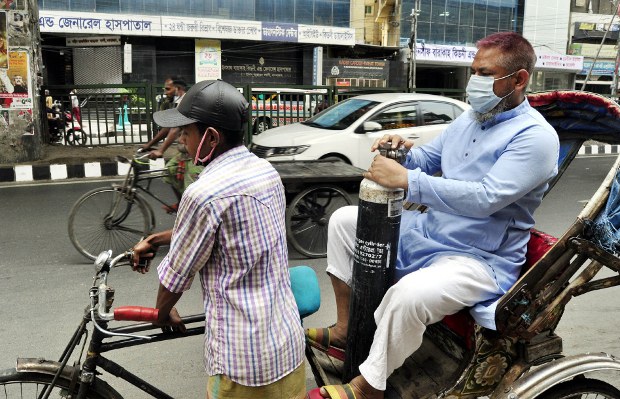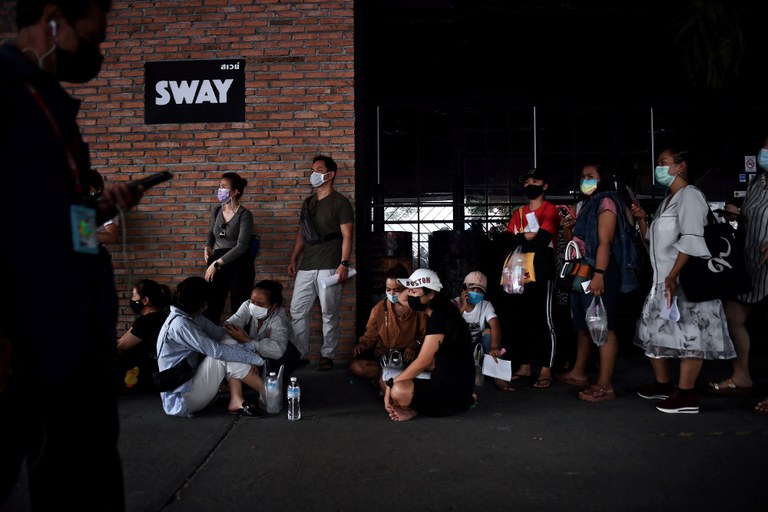Worsening Pandemic Dampens New Year’s, Ramadan Spirit in South, SE Asia
2021.04.08
Dhaka, Bangkok, Jakarta, Manila and Kuala Lumpur
 A man carries an oxygen cylinder to deliver to a family member infected with COVID-19 in Dhaka, April 8, 2021.
A man carries an oxygen cylinder to deliver to a family member infected with COVID-19 in Dhaka, April 8, 2021.
COVID-19 will put a damper on New Year festivities and the observance of Ramadan for the second year in a row in Bangladesh and many Southeast Asian nations.
Countries around the region have imposed total lockdowns or instituted strict curbs on movement because of an alarming spike in coronavirus infections, with vaccine delays adding to the health crisis.
Bangladesh, the Philippines and Thailand have reported a huge surge in COVID-19 cases. Indonesia, Southeast Asia’s most populous nation, still has one of Asia’s highest rates of transmission of the novel coronavirus disease.
In addition, coronavirus vaccine delays are set to affect most of these countries, either due to shortages or what some say are faulty procurement policies.
People are frustrated with what they see as an over reliance on lockdowns by governments perceived to be incompetent at signing vaccine deals and implementing enduring health protocols.
In Bangladesh, this frustration boiled over in violent protests this week, with police shooting at demonstrators who were agitating against a week-long lockdown imposed by the government.
Instead of staying the course amid daily new highs in COVID-19 infections, Bangladesh’s government walked back many of its lockdown measures.
First, it allowed public transport services to resume in Dhaka and some other areas, and on Thursday, it said stores and shopping malls could reopen ahead of the Bengali New Year and the start of Ramadan next week.
For Dr. Nazrul Islam, who is part of a national COVID-19 committee, the government’s backtracking is emblematic of all that is wrong with the way it has handled the pandemic.
“There would have been no need for separate interventions in public transport or shopping malls’ operations if they had enforced the practice of health protocols from the beginning,” Nazrul told BenarNews, referring to a dangerous backsliding in the use of protective masks and social distancing.
But Kamal Hossain, a trader who works at the Dhaka New Market, expressed relief that shops could reopen.
“If the shops remain closed ahead of mega celebrations like the Bangla New Year and Eid-ul-Fitr [the end of Ramadan], they will face serious losses,” Kamal told BenarNews.
“I have still not been able to make up for the loss from the closure of shops last year.”
On Thursday, Bangladesh reported its highest ever daily new COVID-19 infections – close to 7,000 – taking the cumulative caseload to 666,132. With another 74 virus-related fatalities, total deaths due to COVID-19 rose to 9,521.

People wait outside a nightclub for their turn to have a swab sample taken at a mobile COVID-19 testing unit in Bangkok, April 8, 2021. [AFP]
New COVID-19 cluster in Thailand
By contrast, the situation in Thailand is not as grave as in Bangladesh, but is worrying to health officials nevertheless, because the country had for a long time managed to keep a lid on COVID-19 infections.
The Thai government on Thursday shut bars and nightspots for the next two weeks in 41 provinces, after a spike in infections linked to Bangkok’s nightlife venues. This shutdown comes ahead of Songkran, or the Thai New Year festival, next week.
Events at some of these pubs and hotel bars were also reportedly attended by the minister of transportation and many civil servants, sparking anger among a public already upset at a perceived slowness in the government’s acquisition of COVID-19 vaccines.
Taweesilp Wissanuyothin, the spokesman for the government’s anti-COVID task force, said Thursday that at least 504 people had been infected from the nightspots’ cluster.
According to officials, 42 policemen, and people working at the attorney general’s and other public offices, had also contracted COVID-19.
Opposition lawmakers and some health experts, meanwhile, have criticized the government for relying heavily on coronavirus vaccines from one developer, Anglo-Swedish firm AstraZeneca.
With 405 new COVID-19 infections on Thursday, Thailand’s cumulative caseload rose to 30,310.
With a government ban on gatherings of more than a 100 people, and New Year activities such as parties, music concerts and water fights, it will be a tense Songkran as the authorities try to contain the latest COVID-19 outbreak.
AstraZeneca woes
Elsewhere in Southeast Asia, Indonesia on Thursday said it was negotiating with China for up to 100 million additional doses of COVID-19 vaccines after delays in the delivery of the shot developed by AstraZeneca.
This is in addition to 125 million doses of its vaccine that Chinese state firm Sinovac had earlier agreed to supply to Indonesia.
The country’s health minister, Budi Gunadi Sadikin, said AstraZeneca was expected to deliver only 20 million doses for this year, instead of 50 million doses as agreed in a bilateral deal. This is because of export curbs by India, where the vaccine is manufactured, amid rising COVID-19 infections there.
Indonesia’s share of AstraZeneca vaccines, through the multilateral COVAX scheme led by the World Health Organization (WHO), has also been delayed for the same reason, Budi said.
Bangladesh, in fact, got no AstraZeneca vaccine deliveries in March, Dr. Mirzadi Sebrina Flora, a Health Directorate official, told BenarNews.
The Serum Institute of India, which manufactures the AstraZeneca vaccine, was expected to ship a total of 30 million doses of the vaccine over six months, starting in January 2021.
Mirzadi said the government had written to the Indian drug maker at the end of March but had not heard back.
It is not yet known whether the shortfall of AstraZeneca vaccines and the COVAX shipment delay would affect Indonesia’s campaign to vaccinate 181.5 million of its 270 million people by March 2022.
The number of confirmed COVID-19 cases in Indonesia rose by 5,504 to 1,552,880 on Thursday, according to the health ministry. The virus-related death toll rose to 42,227 after 163 fatalities overnight.
While new infections are down from record highs in February, Indonesia continued to report on average more than 4,000 cases daily in March and April, causing the world’s most populous Muslim-majority country to announce a ban, almost two months in advance, on travel for the festival of Eid which falls in mid-May.
On Thursday, the government announced it would block road access in more than 300 places to reinforce this ban on the annual Eid homecoming tradition.

Philippine President Rodrigo Duterte (left) sits with Sen. Bong Go at an undisclosed location, in a photograph released on April 7, 2021. [Photo courtesy Sen. Bong Go]
On Thursday, the neighboring Philippines said it had suspended the use of AstraZeneca COVID-19 shots for people below the age of 60.
This decision came after the European Union’s drugs regulator said on Wednesday that it found “very rare cases of blood clots” among some adult recipients of the AstraZeneca vaccine.
On Monday, the government extended by another week the lockdown it imposed in Metro Manila and four nearby provinces as COVID-19 are rising at such a fast pace that overwhelmed hospitals have been rejecting patients.
The Philippines reported 9,216 new coronavirus infections on Thursday, bringing to 828,366 the total number of those infected in the country. With 60 new virus-related fatalities, the COVID-19 death toll rose to 14,119.
Meanwhile, speculation about President Rodrigo Duterte’s health has been swirling on social media after he called off two public engagements this week, and after a report Wednesday said that members of his Presidential Security Guard had contracted the virus. Earlier this week, Defense Secretary Delfin Lorenzana announced that he had tested positive for COVID-19 and was in self-quarantine.
Presidential spokesman Harry Roque on Thursday said Duterte was safe and healthy.
Separately, Malaysian Prime Minister Muhyiddin Yassin on Thursday urged Developing-8 (D-8) member-nations to work together to speed up production of coronavirus vaccines.
“Although the vaccination roll-out program is ongoing for some countries, there are still others waiting for vaccines’ arrival,” Muhyiddin said at the virtual summit, which included leaders from D-8 member-states Bangladesh and Indonesia.
“Thus, there is an urgent need for all of us to work together to accelerate the development and production of vaccines and assure equitable and affordable vaccines for all.”
Jesmin Papri in Dhaka, Nontarat Phaicharoen and Wilawan Watcharasakwet in Bangkok, Ronna Nirmala in Jakarta, Marielle Lucenio in Manila, and Muzliza Mustafa in Kuala Lumpur contributed to this report.







